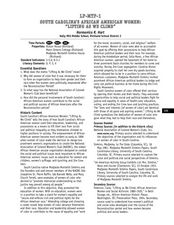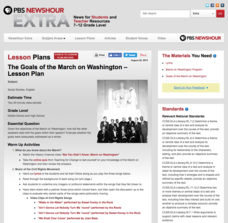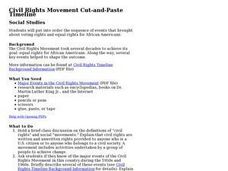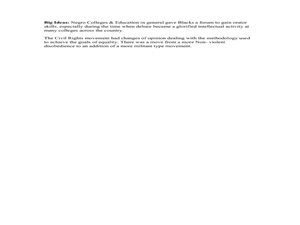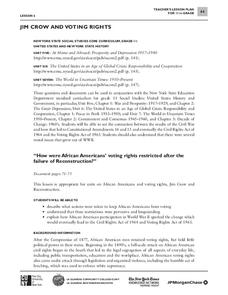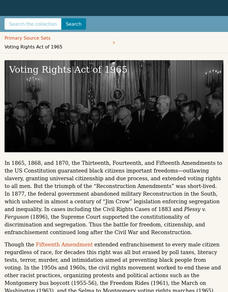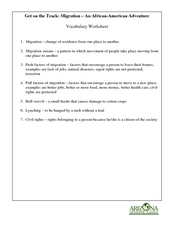K20 LEARN
LBJ and Voting Rights
Challenges to voting rights is not a new thing. Using President Lyndon B. Johnson's 1965 "The American Promise" speech on voting rights as a starting point, young historians research current voting rights laws and challenges.
National Endowment for the Humanities
Women's Lives Before the Civil War
Women's lifestyles before the Civil War made a huge impact as a point of causation. Give middle schoolers the opportunity to view firsthand the lives of women before the Civil War. They analyze primary source documents, view photographs,...
Curated OER
That's So Raven: True Colors
Students study the contributions of African Americans and place these figures on a timeline. They examine the Civil Rights Acts and how it came to be using a Disney Cable in the Classroom lesson.
Curated OER
South Carolina's African American Women: "Lifting As We Climb"
Middle schoolers explore the formation of the National Association of colored Women's Club. In this civil rights instructional activity, students research the history and mission of the NACWC.
PBS
The Goals of the March on Washington
Who else had a dream other than Martin Luther King, Jr.? Pupils explore civil rights leaders in a fourth lesson out of a series of five about people who paved the way to freedom for African Americans. The inquiry-based unit has your...
Curated OER
The Student Non-Violent Coordinating Committee
Pupils identify and analyze the motivation behind the African-American students in organizing the sit-in if Greensboro and the formation of the SNCC. Pupils identify how the generational differences between members of SNCC and other...
Curated OER
From Jim Crow To Linda Brown: A Retrospective of the African-American Experience from 1897 to 1953
Students examine African American issue between the years 1897 and 1953. In this African American history instructional activity, students research the social, economic, and political conditions of African Americans during the...
Curated OER
Civil Rights Movement Cut-and-Paste Timeline
Students put into order the sequence of events that brought about voting rights and equal rights for African Americans. The creative project can be made very crafty by having students cut out the timeline to be combined with others in a...
Curated OER
Civil Rights Methodology Martin Luther King, Jr. – Stokely Carmichael
Students compare and contrast the visions of Martin Luther King, Jr. and Stokely Carmichael. In this African-American history lesson, students read speeches by each of the men and summarize the arguments made by each of them about...
Curated OER
African American Women Before and After the Civil War: Slavery and Freedom
Students listen to data on African American women in Texas before the Civil War. In this Civil War instructional activity, students compare and contrast the lives of slave and free women, and discuss case studies, locating areas on a...
City University of New York
Jim Crow and Voting Rights
Class groups examine primary source documents to determine how the voting rights of African Americans were restricted after the failure of Reconstruction, and how African American participation in World War II lead to change.
American Institute of Physics
African American Physicists in the 1960s
Physicists Herman Branson and Tannie Stovall provide young scholars with two very different perceptions of the status of African American physicists in the 1960s. After reading and comparing the bios of these two men, class members read...
Curated OER
Dr. Martin Luther King Jr.: Follow the Dream: Celebrating Diversity
The teachings of tolerance and diversity are necessary and poignant at all times of the year and for every grade level. This lesson focuses on Dr. King's message and how it has impacted African/American culture. Students will complete a...
American Institute of Physics
Meet Four Pioneering African American Astronauts
An out-of-this-world resource introduces young scientists to four African American astronauts: Michael P. Anderson, Ronald E. McNair, Guion S. Bluford Jr., and Jeanette J. Epps. Groups read biographies of these individuals and prepare...
Digital Public Library of America
Voting Rights Act of 1965
Despite the passing of the Thirteenth, Fourteenth, and Fifteenth Amendments, as well as the passing of the Voting Rights Act of 1965, the struggle to ensure fair voter registration and election procedures continues. Young historians...
National Woman's History Museum
African American Activists
Ida B. Wells, Rosa Parks, and Fannie Lour Hammer are three African American activists who stood up for change. Though living in different time periods, all three women sought justice and equality. Class members examine primary source...
PBS
Voting Rights History
Why is voting so important, anyway? Learn more about the importance of exercising a right for which many men and women marched, fought, and legislated with an interactive timeline activity.
Curated OER
Migration: An African American Adventure
Learners read the book, The Great Migration by National Geographic, then complete this set of related worksheets. They review vocabulary, complete five short answer questions, discuss push and pull factors for the migration, then write a...
Curated OER
African Americans in Aviation: The 1940s- A Decade of Change
Students investigate African Americans in aviation. In this primary resources activity, students examine primary resources to research the history of African American in aviation. Students answer two research questions and write an essay...
Curated OER
Let Your Motto Be Resistance: African American Portraits: Grades 3-5
Young scholars explore the contributions of African Americans of the 20th century. In this African American history lesson, students examine portraits of Muhammad Ali, Romare Bearden, Lorraine Hansberry, Judith Jamison, and Leontyne...
Curated OER
Continuity or Change? African Americans in World War II
Students examine the experience of African Americans during World War II by analyzing primary sources and formulating historical questions. They evaluate if the African American experience during World War II represents continuity or...
Humanities Texas
Primary Source Worksheet: Lyndon B. Johnson, Excerpt from “To Fulfill These Rights”
"Equal opportunity . . . is not enough." Johnson's 1965 commencement address to the students at Howard University provides an opportunity for participants to see how education was a key element in his vision for civil rights.
Curated OER
Race and Voting in the Segregated South
Students examine the history of African American voting rights. In this voting rights instructional activity, students listen to a lecture on African American voting rights between the years 1890 and 1965. Students respond to discussion...
Curated OER
Civil Rights
Students study the social and political events in Virginia linked to desegregation and massive resistance and their relationship to national history. They examine the "Jim Crow" laws and how they affected the lives of African Americans...





